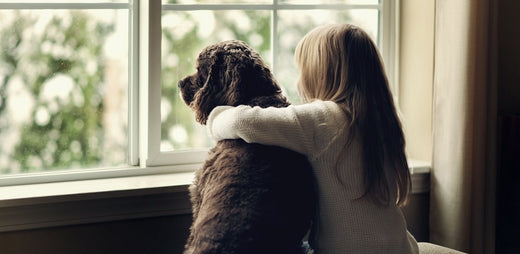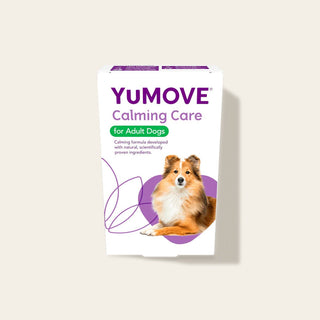

Dogs and fireworks: how to calm dogs during fireworks
Firework season might be a time of joy and celebration for us, but for our dogs, it can feel like a whole other world – loud, unpredictable and overwhelming.
So, if you’ve been searching for advice on how to calm your dog during fireworks, you’ve come to the right place. And the good news is, with the right tips and tricks, you can help your furry friend feel safe and secure during firework season.
Why are some dogs scared of fireworks?
There are a number of reasons why some dogs are scared of fireworks while others seem unphased. Breed can play a part, with Corgis, Collies and Terriers said to be more likely to be afraid than Labs and German Shepherds. Age can also be a factor, as can early exposure to either fireworks or loud noises.
Dr Charlotte Rice, in-house Senior Veterinary Technical Manager at YuMOVE, explains: ‘Most dogs have far more sensitive hearing than us humans, which means those loud bangs can sound so much more intense. Pair that with bright flashes of light, and it’s no wonder some dogs get scared of fireworks. Of course, dogs also lack context – they don’t know fireworks aren’t a threat, so their instincts can take over, which can lead to anxiety and fear.’
Signs your dog may be afraid of fireworks
It’s important to spot the signs your dog is stressed during fireworks so you can step in to help. Your pooch might be telling you they're feeling scared through certain behaviours. Watch out for signs like panting, pacing, hiding, or even trembling.
Dilated pupils, pinned-back ears, and a tucked tail are all physical signs your dog is afraid. Some dogs might bark or whimper more than usual, while others might try to escape or may misbehave. Sound familiar? Don’t worry, there are steps you can take to ease the stress.
For more clues, take a look at how your furry friend communicates, check out this guide to the signs of stress in dogs.

How to help calm dogs during fireworks
Wondering how to help dogs with fireworks? Below are some simple tips to help calm your dog.
Create a safe space for your dog
When they’re frightened, a dog’s instinct can be to run away, so make sure your outside doors are shut and that your pooch can’t get out. Keep a couple of internal doors open so they don’t feel trapped and confined to one space – this could make things worse if your dog feels like they can’t move.
Creating a safe space for your dog and allowing them to choose where to hide can be a comfort to them. This might be their bed, a crate, a blanket under the table or a space in your home where your dog feels comfortable. Introduce this space in the weeks before you expect the fireworks to start so your pet knows it’s somewhere they can de-stress and be safe.
Distract your dog whilst fireworks are going off
Sometimes, a tactical distraction can work wonders! Whether it’s your canine's favourite toy, a yummy treat, a bit of relaxing brushing, or lots of cuddling and playing, taking your dog’s mind off what’s going on outside and giving them some extra attention can be an effective way of dealing with anxiety.
Draw the curtains and close the windows
Try blocking out as much noise and light as possible by keeping windows closed and locked. This can help to muffle the sound of fireworks. Closing your curtains or replacing them with darker/heavier ones can also help keep out any flashes of light associated with the “bang” of fireworks.
Play some relaxing music or turn on the TV
Sound can be a lifesaver during firework season. Playing calm, soothing music, like classical tunes, can create a peaceful atmosphere and mask the fireworks. Classic FM even runs a Pet Classics programme specifically for firework season, so it’s worth tuning in.
Alternatively, having the TV on as background noise can also help. Familiar sounds can create a feeling of normality and drown out the fireworks, keeping your dog calm and reassured.
Consider a calming supplement
For a natural alternative, consider exploring products like YuMOVE’s dog calming tablets. These supplements are packed with scientifically backed ingredients – including soothing Lemon Balm and L-Tryptophan, an amino acid involved in the production of the happy hormone serotonin. They can help to manage stress in dogs, offering them a sense of calm when it’s needed most.
For the best results, introduce a supplement at least 4-6 weeks in advance.
Remain calm around your dog
Dogs are quick to pick up on your feelings. If you’re nervous or frantic, your dog will be too. The best thing you can do is act as normally as possible to show them there’s nothing to fear.
Following your dog around or being overly fussy could cause them to feel nervous or confused if they aren’t used to it. The more you change your behaviour, the more anxious your dog may become.
If your pup seeks attention or comfort, it’s fine to reassure them calmly, but avoid overdoing it – your dog needs you to set the tone for relaxed behaviour.
Always seek advice from your vet
Sometimes, despite your best efforts, your dog may still struggle with fireworks. If the techniques above don’t work, or if your dog is experiencing prolonged anxiety or a change in behaviour, seek professional advice from your vet. They may be able to provide medication to help reduce your pet’s anxiety or put you in touch with a behavioural expert.
A calmer firework season for you and your dog
Firework season doesn’t have to feel like a whirlwind of stress. By creating a safe environment, offering distractions, and managing your own behaviour, you can turn things around for your furry friend. And remember, help is always available – be it through your vet or our popular calming supplements for dogs.
Your dog trusts you, and with these tips, you’ll remind them there’s nothing to fear. All that’s left is to enjoy the season, knowing your pup is safe, comforted, and cared for.



